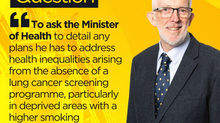Assembly Written Question 17774/17-22
- stewartdicksonmla
- Apr 21, 2021
- 3 min read

To ask the Minister for Infrastructure whether she will consider free or reduced cost parking to incentivise the purchase of electric vehicles.
Answer: I fully recognise the importance of having modern, reliable public electric vehicle charging infrastructure in providing confidence for users of ultra-low emission vehicles (ULEVs) and in respect of the connectivity improvements this would bring. My Department is, therefore, taking a number of actions in respect of the charge point infrastructure, including: introducing changes to the planning system, through permitted development rights which came into operation on 21 December 2020, to make it easier to expand the charging infrastructure for electric vehicles; contributing circa. £450,000 of match funding towards the EU INTERREG VA Funded FASTER electric vehicle network project to install a total of 73 EV Rapid charging points across the island of Ireland and the West of Scotland by 31 March 2023; and engaging with the Office for Zero Emission Vehicles (OZEV) and the Energy Saving Trust (EST), who administer the On-street Residential Charge Point Scheme (ORCS), to provide charge points for residents without off-street parking, and to ensure the scheme can be accessed by councils in the North.
ESB recently confirmed that it plans to replace approx. 60 charge points i.e. 30 charge posts and a further 5 Rapid charge points to upgrade and improve the reliability of the existing public network. I recently met with ESB to discuss what is required in order to ensure the current network is reliable and remains fit for purpose. Whilst the market is open to other commercial operators who would wish to provide charging infrastructure, to date, ESB is the only public network provider in the North. It is anticipated, however, that where possible the majority of EV charging should be carried out at home with the use of a home charge point. My officials are also considering the future requirements in terms of public charge point infrastructure and will continue to liaise with ESB to consider any specific requests to ensure the public network can meet the needs of EV owners now and in future. ESB currently does not charge e-car drivers for the use of its public charge points in Northern Ireland.
My Department has also been leading a Transport Working Group, set up to inform the transport elements of the Department for the Economy’s Energy Strategy currently under development and consultation. A number of key areas have been identified for consideration including the electrification of transport and the charging infrastructure required to support the uptake of electric vehicles. As part of this work, my Department has commissioned research to consider future demand for charge points in Northern Ireland.
Following the British Government’s announcement that it is bringing forward its plans to ban sales of new diesel and petrol vehicles in the UK to 2030, I have also written to British Ministers to seek clarity on what funding will be provided to support the North in delivering greener, cleaner transport.
Electric vehicles will play an important part in decarbonising transport and a number of other incentives are also in place to encourage the uptake of EVs. The Office for Zero Emission Vehicles (OZEV) provides funding to support the early market for ultra-low emission vehicles (ULEVs) in Great Britain and Northern Ireland including grants for plug-in cars, vans, taxis and motorcycles in addition to grants for home and workplace charging infrastructure.
Action to decarbonise transport, improve air quality and reduce congestion, will also require prioritising measures that reduce vehicle kilometres and encourage walking, cycling and public transport as primary modes of travel in our towns and cities. In addition, by reducing the space allocated to vehicles in town centres, we can create cleaner, greener places that are more attractive for people. Therefore, provision of free or reduced cost parking, whether for electric vehicles or otherwise, is not currently being considered.
I remain committed to working in partnership with Executive colleagues and others across our islands to help deliver a change in the way we travel that also helps us to tackle the climate crisis.

































Comments